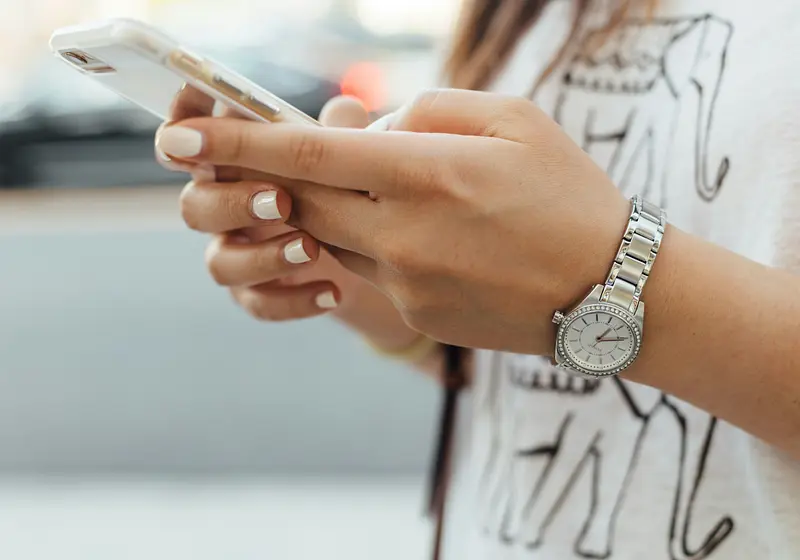Are you impatient when you don't find your mobile showing a notification?
Does running out of battery scare you?
Have you tried to cut down on your phone use without much success?
While most of us are not likely addicted to our smartphones, an over-dependence on our devices can be an issue whether we'd like to admit it. It is understandable with a wealth of information online and literally at our fingertips, the bonds of friendship woven within Snapchat and Instagram, and entertaining content continually overflowing our feeds. Day in and day out, however, the frequency with which we interact with our devices may be becoming more detrimental to our minds and bodies.
Research has shown that there is scientific reasoning behind why we can't stop looking at, picking up, and checking our phones. This habit developed gradually from the moment we first used them. Our brain processes receiving a text from a friend or getting a notification as a positive experience, causing dopamine release.
This hormone makes us feel pleasure and happiness. Over time, our brain associates this release with phone usage, and the body's natural desire for dopamine translates into a desire for our phone. The repetition with which we pick up our smartphones causes this craving to become increasingly engrained over time, meaning that we yearn for this hormonal boost and act to obtain it with heightened regularity.

Nomophobia is a medical term given to describe the stress and unease in which some feel separated or detached from their mobile phone. Classified as a psychological condition, common symptoms of nomophobia include anxiety and agitation, as well as more noticeable physical ailments such as trembling and perspiration.
With an estimated 6.92 billion phone users worldwide, it seems as though this relatively recent dilemma is bound to soar in prevalence. Cutting screen time would certainly aid those suffering from nomophobia, but it could also benefit the average teen phone user who spends approximately 7 hours daily on the screen.
Indeed, phones have undeniably become an integral part of our lives that we cannot eliminate. Still, we can redefine our relationship with them to lead a more productive, healthy lifestyle.
Here are ten tips on how:
Let us slide into your dms 🥰
Get notified of top trending articles like this one every week! (we won't spam you)1. Give Your Phone Some Alone Time
Leave your phone in one place at home - and not right next to you! It's important to make the most of valuable moments with family and fully enjoy precious quality time during family meals or watching TV rather than being consumed by the screen. Your phone can also be a huge distraction when studying. Keep it in a drawer or cupboard if you really can't tear yourself away from it.

Take the Quiz: Discover Your Ideal Stress-Relieving Hobby
Everyone deals with stress differently, and finding the right hobby can help you relax and unwind. Take this quiz to find out which stress-relievin...
2. Distinguish Between Phone Time and Friend Time
Following on from above, this is also relevant when socializing with friends. Although it may be tempting to watch things online together, stay disciplined and push your phone aside. It may seem a minute change, but research has shown that phone use can decrease your engagement during social interactions and jeopardize the quality of conversation.
3. Urgent Notifications On, All Others Toggled Off
Most of us have a copious collection of downloaded apps, equating to many notifications lighting up our screens daily. While some may be highly important, such as messages or calls from family or work, many will be irrelevant or at least not necessitate immediate attention. Keep alerts for what you deem most important, and switch off those for anything else. You'll be much less distracted without the beeping and buzzing every few minutes.

4. Get a Good Old-Fashioned Alarm Clock
Using your phone as an alarm means you use it last thing before bed, leave it beside you all through the night, and reach for it first thing in the morning. Chances are this will lead to additional screen time before bed, which is detrimental to sleep quality. Furthermore, by immediately giving attention to your messages or new notifications in the morning, you dilute your thoughts and goals, which should give you clarity at the start of the day.
5. Find Other Pastimes When Traveling
During lengthy train or car rides, picking up your phone to pass the time is incredibly tempting. Break this unhelpful habit and make the journey much more productive by bringing along a thrilling book or using the time to catch up on studies and make a start on homework assignments. If you'd rather give your mind a restful break, look out the window and immerse yourself in the scenes passing by.

6. Set Screen Time Limits (Obviously)
One reason our screen time can escalate frighteningly quickly is that we don't realize how much time is lost mindlessly scrolling through apps. This is especially true for those with an endless supply of short videos constantly fed through to us. By setting screen time limits, we are reminded when we've had our allocated daily usage of each app so that we never surpass this restriction.
7. Open Apps on the Web
Apps such as Spotify and WhatsApp have their own web versions, which can be accessed online using a laptop or tablet. Although this doesn't keep you away from a screen, it keeps you off your phone and less inclined to wander onto other apps. In addition, you can keep the app open on an extra tab while studying or working.
8. Cut Off Before Bed
Although many of us use our phones before bed to relax and wind down, it's much more beneficial to just turn off your device by a certain time. Eliminating evening phone usage is a good way of switching off from the online world and some of its stressors. Use the quiet time before bed to read or reflect on your day.
Christopher Jolly from Unsplash
9. A Case is Accessory Enough
Recently, there has been a growing trend towards phone charms, straps, and pop sockets to decorate your device. Although they seem unique ways to adorn and personalize your phone, they could also have unforeseen effects. Having an aesthetically decorated phone may make you more prone to picking up or holding it, which could inadvertently boost screen time. I advise that you all need a sturdy case and a durable screen protector.
10. Live in the Moment
In a world where social media is speedily gaining influence, especially among young people, many feel inclined to share their memorable and exciting experiences online. Although this may be fun, there is an extent beyond which it no longer has a positive effect. Rather than taking excessive videos or pictures and ironically letting the special moment slip away, take it in for yourself - your photo library will never surpass your own memories.
Building a better relationship with your smartphone may initially seem a daunting challenge. However, with enough perseverance, you can learn to use your phone in a healthy and productive way and still embrace the online world.
















.jpg)
.jpeg)